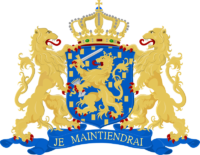The Kingdom Of The Netherlands In The Caribbean. Repairing A Not So United Kingdom ~ Can It Be Done?
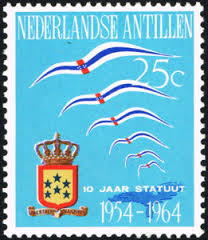 How come there are so many problems in the Kingdom of the Netherlands nowadays? Are there any options to change things for the better? Can the Kingdom be repaired? What should be considered? These are the questions that are dealt with in this paper.
How come there are so many problems in the Kingdom of the Netherlands nowadays? Are there any options to change things for the better? Can the Kingdom be repaired? What should be considered? These are the questions that are dealt with in this paper.
Uneasiness with the Charter’s anniversary; why celebrate?
In anticipation of the 50th anniversary of Het Statuut[ii] some uneasiness has surfaced, both in the Netherlands as well as overseas, about how this occasion should be marked. Is it a time of celebration and, if so, how and what should we celebrate?[iii] Some authorities are concerned that the anniversary of Het Statuut could become a testimonium paupertatis of the operations of the Kingdom in the last 15 years, adding another obstacle into the problematic state of the Kingdom’s Caribbean affairs. Others maintain that the Kingdom’s Charter has served the Caribbean countries well.[iv] In the Dutch press, it is often reported that the Netherlands Antilles are a lost cause; a Caribbean democracy that has turned into a Dutch banana republic (sic) in the West Indies.[v] Over and again, irritation and frustration with the Antilles has been expressed in Dutch media.[vi]
But also the Governor of the Netherlands Antilles did not mince words when depicting (in April 2004) the crisis the Netherlands Antilles is experiencing: widespread and profound poverty, too many school dropouts with no prospects, a drugs trade that is increasingly derailing civil society, too many murders, muggings and burglaries and a frighteningly high crime rate.[vii] The number of homicides on Curaçao is staggering and 30 x higher than in the Netherlands. Instead of a positive celebration, the Charter’s anniversary could painfully highlight the instability of the Kingdom for the Caribbean countries and thus mortgage any attempt to redesign the relationships for years to come. There are several different accounts of why the state of the Kingdom is as it is. Here we explore some of these views.
How come there are so many problems nowadays?
In recent years, social degradation, especially on Curaçao, high Antillean crime statistics in the Netherlands, an unbearable public debt, and outdated doctrines of autonomy and self-help (zelfredzaamheid) have cast a worrisome shadow over the operations of the Kingdom. Crimes, such as international money laundering and the drug-trade, have been gaining a foothold in places outside the control of the dominant formal powers. International terrorism can now be added to this list. The small island states are vulnerable to all of these opportunistic dangers as well as to environmental damage by international corporations. The drugs trade to satisfy consumer demand in Europe and the USA has pervaded Caribbean society. In 2001-2003, flights from Curaçao to Schiphol Airport, Amsterdam, were literally loaded with both traffickers and drugs.
Mismanagement and neglect of the welfare systems in the Netherlands Antilles have long driven strong migration to the Netherlands. Free migration is seen as a lifeline on the Caribbean islands, it is one of the Kingdom’s most valuable assets. Yet this strong migration to an overseas social paradise has sharply driven up the Antillean share in the Netherlands’ crime and unemployment statistics. So-called Antillengemeenten have sprung up, leading to calls in the Netherlands to close its borders to these migrants in future, or at least to Antilleans with a criminal record at home. The Dutch – Antillean relationship has become: ‘sensitive, unequal and laborious’.[viii] There are various ways of interpreting this state of affairs in the Kingdom. Read more
The Kingdom Of The Netherlands In The Caribbean. The Kingdom Charter (Het Statuut): Fifty Years In The Wilderness
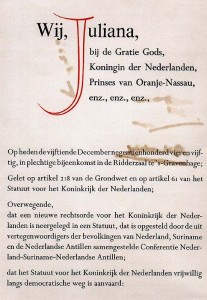 In this paper[i], the author will approach Kingdom relations from a socio-historical perspective. The point of departure is, as one writer puts it: ‘The Caribbean was the least exotic, the most Europeanized and the least deserving of independence’.[ii] An analysis of the socio-historical factors underpinning the Kingdom then leads to the conclusion that the only two islands to achieve Separate Status in the Caribbean, Anguilla and Aruba, only achieved it by violence, or the implied threat thereof. This leads to the final conclusion that the present approach of conferences and papers will, taking the past into consideration, probably not lead to the desired constitutional changes. The aimless wandering in the desert will persist.
In this paper[i], the author will approach Kingdom relations from a socio-historical perspective. The point of departure is, as one writer puts it: ‘The Caribbean was the least exotic, the most Europeanized and the least deserving of independence’.[ii] An analysis of the socio-historical factors underpinning the Kingdom then leads to the conclusion that the only two islands to achieve Separate Status in the Caribbean, Anguilla and Aruba, only achieved it by violence, or the implied threat thereof. This leads to the final conclusion that the present approach of conferences and papers will, taking the past into consideration, probably not lead to the desired constitutional changes. The aimless wandering in the desert will persist.
During a conversation some time ago à propos of Separate Status, former island council member, and prominent St. Maarten businessman Vincent Doncker flatly stated: ’unless we are prepared to fight and shed blood for separate status it will not happen’. This seminar from that perspective is itself questionable. Constitutional change is fought for with blood and bullets, not polite lectures and garden parties. One of the most insightful comments along that line came from dr. Nilda Arduin. ‘All the reports’ she stated, ‘will not accomplish anything unless there is a change of mentality and people really start to want and desire constitutional change’. Along those same lines, Drs. Leopold James of the St. Maarten Nation Building Foundation has persuasively argued that before separate status, or for that matter, any status can be achieved, there must be a process of Nation Building. By this, James means to say, a desire of the people to identify themselves as a separate people or nation, distinct and apart from others. Unless this desire is stimulated and nurtured, the population will remain apathetic and lukewarm towards any constitutional change, no matter how much the political leadership exhorts them to embrace it and talks up one or the other status, whether it be Kingdom Island, Separate Status, Country within a Country, FISSA, or tragically, independence. There is no popular outcry for constitutional change. During the last elections in St. Maarten, Separate Status was never mentioned by any party. Rather, it was sprung upon us, while we quietly were going about our business. Apart from the leader of government, who has a vested interest in Separate Status, and is a very courageous lady, I have never heard any other member of the Executive Council spontaneously express the faintest interest in Separate Status.
It is frequently, if not reliably, said that the Caribbean is the most reported-on area of the world, Irene Hawkings wrote in The Changing Face of the Caribbean. That was in 1970. Within the Caribbean I am certain the Netherlands Antilles occupies a special place as a world record holder in the production of reports. It is within this context that the recently issued report, proclaims with false courage: ‘The time is now, Let’s do it’. Perhaps, its authors suspect only too well what will be its fate. A spot on some library shelf along the 800 or so other reports on constitutional change, gathering dust. The Antilles have cried wolf too often to be credible. On December 13th, 1975, for example, premier Evertsz solemnly declared to the Antillean parliament, that the first phase of the realization of Antillean Independence was about to begin, with the regulation of the internal structure amongst the islands.[iii] This is exactly what the ‘Let’s do it’ report is still trying to report on in 2004, some 30 years later. This is rather odd for as recently as 1993 Payne and Sutton (Modern Caribbean Politics) held that modern politics in the Caribbean has been concerned with the achievement of political independence. A new political party, Movimiento Antias Nobo of Don Martina was founded to guide the process announced by Evertsz. The MAN is now a shambles. After the 1993 referendum, another political party that was supposed to carry out the wishes of the people, the PAR of Miguel Pourier was founded to carry out the restructuring.[iv] It came to nought. In an emotional farewell lecture, entitled ‘The Constitutional Restructuring of the Netherlands Antilles: Not words, but deeds’[v] presented on Friday, June 5th 1995, professor A.B. van Rijn, of the University of the Netherlands Antilles, stated: ‘Disappointment will be disastrous for people’s faith in politics. Not only that, but social peace and the investment climate are at stake’.[vi] Society yawned apathetically at his speech. Life continued pretty much as before. None of his predictions came true. Hirsch Ballin created a stir in 1990 with his ‘Sketch of a Commonwealth Constitution for the Kingdom of The Netherlands’,[vii] which in turn caused more ink to be shed in various publications and articles, most notably by Fernandes Mendes and Bongenaar (Uni ku UNA). The ‘Let’s do it’ report therefore has a long pedigree, going back to the van Poelje reports of 1948. Van Aller writes about a ‘a dizzying number of models’ [viii] with regard to the reports and studies on constitutional reform carried out over the past 50 years. The latest report is but a mish mash of all previous reports with little new to add. Van Aller surveying this state of affairs, writes: ‘(…) one can conclude that restructuring had yielded little. Theory had produced many models, but in politics hardly any attention was paid to them’.[ix] The wandering in the dessert continues. Read more
The Kingdom Of The Netherlands In The Caribbean. The Politics Of Autochthony And Economic Globalization: Seamy Sides Of The Same Coin
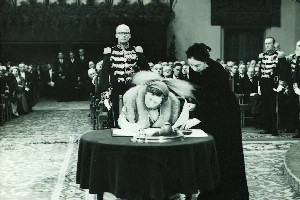
Koningin Juliana tekent het Statuut voor het Koninkrijk der Nederlanden, waarin een nieuwe rechtsorde wordt vastgelegd voor de relatie van Nederland met Suriname en de Nederlandse Antillen
True human progress is achieved not so much by the application of ideas thatare original as by ideas whose application brings more human beings together toshare a richer and fuller life.
John Blacking (1969: 60)
What this essay is about
After 50 years of the Kingdom Charter, the people of Sint Maarten want change. They want their country to gain a separate status within the Dutch Kingdom. A status that will be similar to the one Aruba currently enjoys; one that grants them direct access to the Netherlands, circumventing the bureaucracy of Curaçao. In this essay I argue that the success or failure of their representatives to achieve this goal will depend on how these engage the politics of autochthony, one of the dominant modes of thought of our times.
This mode of thought finds expression in the columns of mainstream public intellectuals in the Netherlands and on Sint Maarten who talk about the loss of ‘authentic culture’ and the cultural alienation of the autochthons. The loss is blamed on the onslaught of globalization, both from within and from without. The intellectuals on the right blame the working class newcomers (Third World globalization agents from within), while those on the left favor presenting us with a secret complot of North American capitalists pulling the strings of the Bush regime (the First World globalization agents from without). It is an odd combination, surreal, but it is one that is effective in a time of anti-Americanism and anti-multiculturalism.
Mainstream public intellectuals in the Netherlands enjoy the respect of the masses as well as the elite. Think of Paul Scheffer, Bas Heijne, Jan Mulder, and Theo van Gogh.[i] Many Dutch people eagerly read their columns, which are increasingly spiced with autochthony. Their success has to do with the fact that those who write well are highly regarded, the vast majority of the Netherlanders can claim to be autochthon, and the idea that Holland is the most tolerant of all Western countries is well ingrained in the minds of most. Many autochthons have imbibed the idea that the US could learn a thing or two from the Dutch, and not the other way around. Unable or unwilling to see the strong economic links between the US and the Netherlands, sentiments of anti-Americanism can proliferate without a sense of hypocrisy. It can be found in the left and in the right of the political spectrum. To strengthen their cause of anti-Americanism, which they equate with anti-capitalism, leftist intellectuals appeal unwillingly to the idea of Dutch exceptionality. Conservative intellectuals appeal to this same idea to warrant their appraisal of working class newcomers. Newcomers should thank God that they have the privilege of living among the tolerant Dutch. They should shed their cultural expressions as soon as possible and become like the Dutch. Newcomer intellectuals such as Ayaan Hirsi Ali who sing praise to this supposed beacon of enlightenment strengthen their sense of Dutch exceptionality.[ii] It is almost a caricature when one observes leftists intellectuals countering those on the right by claiming that it is an aberration of the spirit of Dutch culture to be so intolerant towards newcomers.
The same division between conservative and leftist intellectuals is discernible on Sint Maarten. Leftists cry ‘shame on America,’ adding that the representatives in The Hague and Brussels are also puppets of global capitalists. Sint Maarten will not be healthy until it severs its ties with the Netherlands, joins the bandwagon of Third World states resisting capitalism, and salvages its true ‘autochthon soul’. Those on the right care little about global dynamics, blaming the working class and upper class newcomers for corrupting society. The autochthons are undergoing a process of cultural alienation, becoming strangers in their own country, and therefore they need to assert their right before all his lost. As is the case in the Netherlands, mainstream intellectuals on the left as well as on the right appeal to autochthony. Read more
The Kingdom Of The Netherlands In The Caribbean ~ Denicio Brison To Francio Guadeloupe
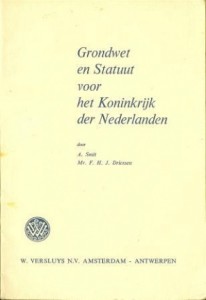 I have read your paper and would like to address a few of the issues you have raised.
I have read your paper and would like to address a few of the issues you have raised.
First of all, I have worked out a theoretical frame work that relies on a mathematical model to predict when autochthony would rear its head. Basically it states that every society has a given tolerance level for accepting outsiders. Once this level is breached, the reactions you describe set in. But there are other factors; different groups in the same society display different levels of tolerance to foreigners, depending on how much they benefit from foreigners or are threatened by their presence. In addition, there are differences in tolerance levels for different types of foreigners, depending on education levels, racial background and perceived integration prognosis. In addition, these tolerance levels change over time, within all the various categories. By assigning values to the different variables I mentioned and plugging them into an equation one can attempt to project just how many foreigners the local population as a whole can tolerate without creating social friction and resentment. Sure, we all belong to the human race, but still we need time to adapt to the changes the movement of people creates. By being sensitive to the tolerance level of the host country and showing understanding for the fears and anxieties of their hosts, prospective immigrants can make their adjustment much easier. They can also identify countries where their presence is more appreciated and avoid countries where tolerance levels are approaching the breaking point. It makes no sense to force oneself on others, no matter how much the Other is a member of the human race. Forcing the issue only creates friction and resentment.
Secondly, don’t many people still believe that there are distinct races? You state that differences in phenotype are but superficial adaptations to the environment: ‘Europeans, Asians, Australians, and Americans are disguised Africans’. Try selling this idea, i.e. that whites are disguised Africans, and experience the hostility the very idea provokes. Academics readily accept this theory. But it is with the same approach as evolutionists. They accept that we are descendants of apes, but it was all so long ago, so speculative as to render it nothing more than a vague abstraction. So too, should the idea of black as the proto-type of the human race be seen. Keep it safely in the outermost recesses of human existence. A long, long time ago. Most whites would be deeply offended by anything more immediate.
Thirdly, what do you mean with: ‘Employing the moral science of statistics’. Is statistics a ‘moral science’?
Fourthly, living on Sint Maarten, one can safely argue that ‘neo-colonialism’ is not an outdated concept at all, but alive and well. Classical colonialism was the exploitation of the colony for the benefit of the mother country. Neo-colonialism is the exploitation of the colony for the benefit of agents of the mother country, its most visible manifestation being technical and other forms of ‘assistance’. Technical assistants earn many multiples of what a similarly, or better qualified local can expect to earn, live in exclusive enclaves and in general enjoy a luxurious season in Paradise. Big infrastructural projects end up in the hands of contractors of the donor country and the colony or recipient country is little more than a transfer point for the money. Precious little real development ever comes from ‘technical assistance’ or ‘project grants and financing’ (see Gunnar Myrdal on this). Projects such as DEPOS’ are prime examples. Its prime beneficiaries are a coterie of Dutch technical advisors and contractors. This is the reality of the ‘new colonialism’ or ‘neo-colonialism’.
Finally, you state that no country can be truly independent within our global age. My idea is that countries do not seek independence in the classical term of the word but they want sovereignty. Only sovereign countries can collaborate on a voluntary basis, to achieve mutually beneficial ends. A country that is dependent, that has not achieved political independence, cannot enter into agreements with other countries on its own. First of all other countries do not recognize it and secondly, it is the mother country that enters into international treaties for and on its behalf. It is dependent. It cannot act on its own. Only a sovereign country is free to decide to join, say the EU. The EU does not enter into discussions with countries that are not politically independent.
The Kingdom Of The Netherlands In The Caribbean. The Need For A Critical Imagination ~ Francio Guadeloupe (In Reaction To Denicio Brison)
 Reality is not defined by matters of fact. Matters of fact are not all that is given in experience. Matters of fact are only very partial and, I would argue, very polemical, very political renderings of matters of concern and only a subset of what could also be called states of affairs.
Reality is not defined by matters of fact. Matters of fact are not all that is given in experience. Matters of fact are only very partial and, I would argue, very polemical, very political renderings of matters of concern and only a subset of what could also be called states of affairs.
(Bruno Latour)
The counter arguments put forward by Brison in this volume are eloquently phrased, and convey his concern for the welfare of Sint Maarten. Nevertheless they are fundamentally flawed. I shall not address all of his arguments in detail. Instead I will focus on the two major poles around which they revolve. These are Brison’s defence of nationalism, and mathematics as a solution to solving the inevitability of autochthony politics. Reading against the grain and in-between the lines, I have come to the conclusion that he is advocating a sophisticated form of Black Nationalism.
Behind Brison’s politically correct phrasing, excusing autochthony, mathematics creeps up as the magical solution. Through mathematics one would be able to find out who fits where in the world, which people should reside where in the world, and when a society has reached its tolerance level. Later in his rebuttal to my essay Brison asks why I call statistics, which to a large extent is based on mathematics, a weapon often employed to discredit the governing capacities of Antillean civil service, ‘a moral science’? The answer is a simple one. Many intellectuals, who employ statistics to address complex societal matters, reduce the flow of life to a set of hegemonic variables upon which they make equations and then state ‘the facts do not lie’. What they omit is that these ‘facts’ are based upon the mathematical and computational models they choose, and the significance they assign to the variables. Moreover, there is always narration in mathematical models. And it is these narratives together with the techniques employed that define and construct ‘the facts’. Mathematical facts employed in social life do not speak for themselves. There is power and interests behind these.
Unspeakable horrors have been committed when the moral science of statistics has been combined with a politics based on autochthony. Think of the far too little documented fact of eugenic projects implemented in the late 1800s and 1900s throughout the Americas. Statistics, mathematics, and the pseudo science of raciology, were presented as evidence that blacks were degenerates. Legislators and leading intellectuals in Brazil and Argentina reasoned that it was better to encourage immigration of European immigrants since these were supposedly fitter than Africans and Asians. Europeans would not exacerbate the tolerance level of these societies (Andrews 2004). In one sense, it is striking that these earlier proponents of mathematical solutions to immigration employed many of the variables that Denicio Brison does. Education, ‘racial similarity’, and prognosis of integration all ranked high in their elaborate argumentation. They were advocating a practical morality and not what they considered the unrealistic humanism of those who dared dream of a raceless and classless society My unease at the similarities between Brison’s solution and that of the white racists of old, and those who keep the faith in the many power centres of the world, was brought to rest after re-reading Paul Gilroy’s Black Atlantic (1993).
The traditional teaching of ethics and politics—practical philosophy—came to an end some time ago, even if its death agonies were prolonged. This tradition had maintained the idea that a good life for the individual and the problem of the best social and political order for the collectivity could be discerned by rational means. Though it is seldom acknowledged even now, this tradition lost its exclusive claim to rationality partly through the way that slavery became internal to Western civilisation and through the obvious complicity which both plantation slavery and colonial regimes revealed between rationality and the practice of racial terror. Not perceiving its residual condition, blacks in the west eavesdropped on and then took over a fundamental question from the intellectual obsessions of their enlightened rulers. Their progress from the status of slaves to their status of citizens led them to enquire into what the best possible forms of social and political existence might be (Gilroy 1993: p. 39).
Gilroy shows that most blacks were able to create practical philosophies that transcended ideas of nation and ethnicity, however, he also remarks that black nationalists coloured the racial philosophies of the former rulers brown. They eavesdropped on their former master’s concerns without employing their critical imagination, and rebuked the humanism of the common folk for being too naïve: a case of false consciousness. And thus when one looks closely at staunch black nationalists and their white counterparts, one observes that throughout history there have been many similarities. If white was labelled an essential identity, then radical blacks asserted blackness. If whites argued that to every people belongs an exclusive right to a territory, then black nationalists forwarded the same logic. If whites claimed that the minority should lead the masses to the founding of a nation-state, otherwise it would never happened, blacks presented the same reasoning. If whites made hierarchies within the polity assigning some lesser citizenship because of skin colour, ethnicity, religion, or time of arrival then these black intellectuals in the Global South aver that their countries should do the same.
White and black nationalists are seamy sides of the same unusable coin that we should throw away, and with them the idea of exclusive nationalism and sovereignty. This idea has caused so much discord between the peoples of this earth. Decolonization was necessary but for C.L.R. James, Franz Fanon, José Martí, three of the finest minds the Caribbean and the world has produced, it was but a step to a humanism that encompasses the globe. My argument remains that those countries that did not pursue independence in the sixties and seventies, the heyday of the independence struggles, have to understand the world as it is today. It means forging a New International that transcends nationality and ethnicity. An International that uncovers and dismantles the mechanisms which keep the ‘havenots ’ and the ‘have-a-little’ fighting for crumbs, while the handfuls of ‘haves’ eat the global cake. My stay on Sint Maarten convinced me that the most inhabitants of the island are susceptible to a New International attune to their particularities. As I stand in front of a class full of mostly white faces at the University of Amsterdam teaching the unity of humankind as argued by the Haitian Anténor Firmin (1885), the first anthropologist to discredit the idea of different human races, I realize that West Indian blacks who eavesdropped upon their former masters, while employing their critical imagination, spoke the truth to power. I believe that we owe them that much and more. We need to imagine and create new architectures of human commonality in our politics.
The continuous exploitation of man by man, inhumanity of man to man, is reinforced ironically, I believe, by ceaseless catalogues of injustice. We need somehow to find an original dislocation within which to unlock a body of claustrophobic assumptions which strengthen it by promoting a self-encircling round of protest – a continuous obsession with irreconcilable differences – irreconcilable frontiers – irreconcilable ghettos – like a static clock that crushes all into the time of conquest. Much of the character of civilisation as we have known it – has been geared to this static clock which obviously seeks to shape its material, all its human material, into time-tables of defensive capital, defensive labour, and other territorial imperatives. That is why the catalogues of deeds compiled by historians conform to dead time that measures man as a derivative industry making animal, tool-making animal, weapon-making animal. And the quest therefore for an inner clock is so necessary in our situation of social and industrial character geared relentlessly to static time (Harris, 1970: p. 28).
Bibliography
Andrews, George Reid, Afro-Latin America, 1800-2000. Cambridge: Cambridge University Press, 2004.
Derrida, Jacques, Specters of Marx. The State of the Debt, the Work of Mourning, and the New International. New York: Routledge, 1994.
Fluerhr-Lobban, Carolyn Anténor Firmin, ‘Haitian Pioneer of Anthropology.’ American Anthropologist, Vol. 102, no. 3, (2000), pp. 449-466.
Gilroy, Paul, The Black Atlantic. Modernity and Double Consciousness. London: Verso, 1992.
Harris, Wilson, History, Fable and Myth in the Caribbean and the Guianas, the Edgar Mittelholzer lecture. Kingston: University of the West Indies, 1970.
Latour, Bruno, ‘Why Has Critique Run out of Steam? From Matters of Fact to Matters of Concern.’ Critical Enquiry, Vol. 30, no. 2, (winter 2002): pp. 225-248.
The Kingdom Of The Netherlands In The Caribbean. De ‘reinvention’ Van Het Koninkrijk
 Inleiding
Inleiding
Binnen het Koninkrijk is er al een halve eeuw sprake van een LAT-relatie.[i] Onze partner Nederland bevindt zich meer dan negen uur vliegen hier vandaan. De liefde binnen zo’n LAT-relatie loopt het risico om natuurlijk naarmate de tijd vordert te bekoelen. Zeker als er binnen de relatie al vanaf het begin vooral sprake was van wantrouwen en onbegrip.
Het is overigens de vraag of in het begin, nu dus een halve eeuw geleden, bij onze Nederlandse partner de noodzaak bestond om voortaan, zoals de Preambule van het Statuut het zo fraai formuleert, samen met ons ‘op voet van gelijkwaardigheid de gemeenschappelijke belangen (te) verzorgen’.[ii] Waren er overigens wel ‘gemeenschappelijke belangen’, die wij samen zouden kunnen gaan verzorgen? J.H.A. Logemann, die in wisselende hoedanigheden heeft geparticipeerd in het hele proces van totstandkoming van het Statuut, was heel stellig. Volgens hem bestonden er geen gemeenschappelijke belangen. ‘Ik heb al vele malen ook in dit blad (7 en 14 januari 1950) betoogd, dat dit niet het geval is. De drie landen liggen te wijd uiteen, in politiek, economisch en cultureel verschillend milieu; zij bergen te wijd verscheiden bevolkingen. De eenheid van het Koninkrijk berust niet op het feit, dat zijn burgers in een gemeenschap zijn verenigd. De objectieve factoren ontbreken en het wordt ook niet als zodanig gevoeld, noch overzee noch in Nederland’, aldus Logemann.[iii] En toch vond hij dat de rijksdelen bij elkaar moesten blijven.[iv] Hoe dan ook, na samen een halve eeuw meer leed dan liefde te hebben gedeeld blijkt dat meeste Nederlanders geen heil zien in de voortzetting van onze huidige LAT-relatie.[v]
Percepties en realiteiten
De meeste Nederlanders willen dus van ons af. Maar wij willen in het Koninkrijk blijven. Wij denken dat wij met het Statuut een nevengeschikte en gelijkwaardige positie in het Koninkrijk hebben verkregen. En in onze perceptie willen de Nederlanders helemaal niet van ons af. Integendeel, wat zij willen is het Statuut opzij zetten zodat zij ons opnieuw kunnen koloniseren en weer, net als in de tijd van voor het Statuut, de baas over ons spelen. Wij trekken dan ook voortdurend ten strijde om onze gelijkwaardigheid en nevenschikking binnen het Koninkrijk te verdedigen en om respect voor het Statuut te eisen. Wij hebben een diep wantrouwen tegen Nederland en zijn voortdurend op onze qui vive. Want Nederland komt telkens met nieuwe listen om het Statuut uit te hollen. Nu willen ze ons nota bene ultraperifeer gebied van Europa maken zodat wij provincie van Nederland worden en zij dus opnieuw de baas kunnen spelen.[vi]
Terug naar de realiteit. Dezelfde Logemann die meende dat er geen ‘gemeenschappelijke belangen’ waren, was niet erg onder de indruk van wat wij uiteindelijk hadden bereikt in de jarenlange Statuuts onderhandelingen met Nederland. En Logemann kon dat goed beoordelen. Hij kon het eindproduct van de onderhandelingen, het Statuut van 1954, vergelijken met de in 1948 tussen de Koninkrijkspartners overeengekomen ontwerp-Rijksgrondwet voor het Verenigd Koninkrijk der Nederlanden. Daar was hij één van de redacteuren van geweest.
Logemann kon kort nadat overeenstemming was bereikt over het Statuut op een internationaal congres van dekolonisatiedeskundigen meedelen: The surprising result is that Surinam and the Antilles have contented themselves with little more than a consultative role.[vii] Logemann wist waarover hij sprak en hij had gelijk. Het Statuut heeft in tegenstelling tot de ontwerp-Rijksgrondwet van 1948 een strikt hiërarchisch systeem geschapen waarin Nederland een staatkundig dominante positie bekleedt en wij een ondergeschikte positie.[viii] Read more


